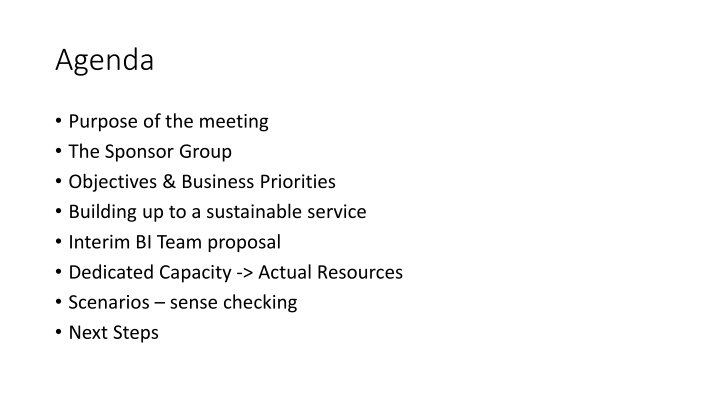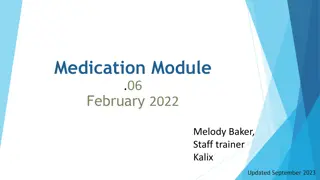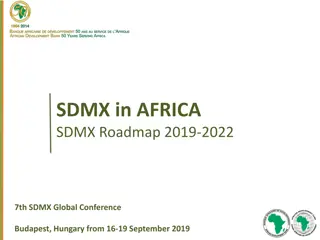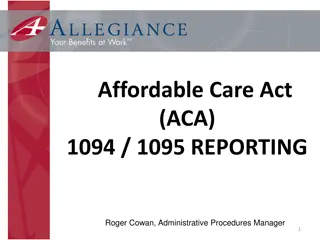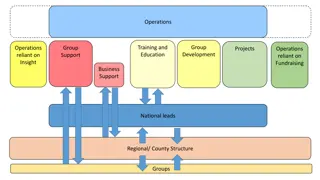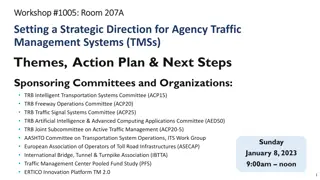BI/MI Sponsoring Group Overview and Responsibilities
The BI/MI Sponsoring Group is crucial for delivering objectives aligned with the organization's strategy. They provide direction for service and development activities, discuss and resolve issues, and ensure alignment with business and technical strategies. Responsibilities include managing BI/MI objectives, stakeholder engagement, budget management, and driving solutions delivery. The group aims to outline objectives and business priorities for sustainable service, particularly focusing on the Interim BI Team proposal and resources scenarios sense-checking.
Download Presentation

Please find below an Image/Link to download the presentation.
The content on the website is provided AS IS for your information and personal use only. It may not be sold, licensed, or shared on other websites without obtaining consent from the author.If you encounter any issues during the download, it is possible that the publisher has removed the file from their server.
You are allowed to download the files provided on this website for personal or commercial use, subject to the condition that they are used lawfully. All files are the property of their respective owners.
The content on the website is provided AS IS for your information and personal use only. It may not be sold, licensed, or shared on other websites without obtaining consent from the author.
E N D
Presentation Transcript
Agenda Purpose of the meeting The Sponsor Group Objectives & Business Priorities Building up to a sustainable service Interim BI Team proposal Dedicated Capacity -> Actual Resources Scenarios sense checking Next Steps
Purpose of the meeting Communicate the urgency. Core Systems go-live approx. 1 year Budget utilisation planned from 15thApril Acknowledge new ways of working within IS Bridging various stakeholder expectations Hear concerns around how we setup and run this. Risk of failure best mitigated with an early attempt than detailed planning. Draw a line in the sand to agree objectives and business priorities for the next stage of the programme. Need to move to a positive Yes, and collective effort to find our feet. Discuss interim BI Team proposal and outstanding decisions required.
BI / MI Sponsoring Group Core Board BI/MI Governance Board Digital Transformation Board Programme Sponsor (Programme Owner) Programme Lead (Business Owner) Service Owner Portfolio Manager BI Team Lead Danny Emerson Jen Milne Lynda (BI/MI Business Lead) Stephen Roy Alex Carter Service Management BI Team
BI / MI Sponsoring Group primary group responsibilities Core Board BI/MI Governance Board Digital Transformation Board Programme Sponsor (Programme Owner) Programme Lead (Business Owner) Service Owner Portfolio Manager BI Team Lead Danny Emerson Jen Milne Lynda (BI/MI Business Lead) Stephen Roy Alex Carter Service Management BI Team Primary Group Responsibilities 1. Deliver the objectives of the BI/MI Programme 2. Provide a clear direction for both service and development activities, aligned to our strategy 3. Discuss and resolve issues and risks
BI / MI Sponsoring Group primary individual responsibilities Overall responsibility for the delivery of BI/MI objectives. Alignment of business and technical strategies. Business Strategy. Requirements prioritisation. Communications. External stakeholder Management. Community engagement & adoption. Liaise and report to DT board on progress. Internal stakeholder management. Budget management. Alignment within the DT Portfolio. Responsible for service management of new BI tools and EDW. Management of direct user requests pipeline and non DT projects. Management and support of self-service BI activities. Responsible for directing the collective effort to design and deliver solutions to meet requirements.
Objectives Objectives The draft paper BI Programme Overview aimed to articulate more rounded objectives and some context of the business areas under consideration for BI work. 1. Reporting Tools 2. Repository for Key University Data 3. Business Intelligence Improvement and Capability 4. Management Information Applications 5. Assist Core Systems (ERP) Migration This was initially prepared for consideration by the BI/MI Governance Board. Subsequent sponsor led decision for the most strategic focus of our BI investments has been approved by both this and the Digital Transformation board.
Business Priorities Business Priorities HR & Finance Strategic Reporting Key part of successful core systems implementation. A strategic choice of needed data in its own right Student data is arguably more needed, but they have little capacity or inclination to engage with us right now. Also the mix of operational and strategic reporting through Business Objects requires a huge reconciliation effort alongside any new development of student data. The new reporting landscape for HR and Finance will have much more clearly distinguished (self sufficient) operational reporting. If we don t take in the old data now we risk losing the ability to do so, and hamper our future analysis until the new ERP is bedded in with history.
Business Priorities Business Priorities Support Self-Service BI & Data Governance Facilitate alignment towards a consistent BI landscape across the University. Data Definitions. Re-use of EDW Org Hierarchy etc. Seek opportunities to expand audience of local solutions. Pro-actively engage and improve data governance. Deliver other small reporting projects as possible Prioritised through the Sponsor group, with input from the respective governance bodies involved. Sponsor funded work can be considered for prioritisation, but strategic projects would take precedence. Build up to a sustainable service as originally conceived Develop the skills, capacity and integrated data to be able to offer a Reporting and Analytics Service for the University.
Different interpretations of a Service We are all aligned in the desire to improve our BI capability at the University. Broadly there is agreement on the idea of a responsive BI service of some form, but the how and when to get there still surfaces debate. Expectations from our investment in BI have been understood differently across internal IS and external stakeholders. IS envisaged a responsive service, open to sponsor funded work, incrementally building up an integrated data source within EDW. Some expected any EDW, Talend and BI Suite related work to also come through that service. Some external expectations were for a populated data warehouse, with the necessary data already in place, and centrally paid for strategic reporting.
Building up to a sustainable service Low Level Student Data Further Estates Data High Level Student Data HR & Finance Data Viable integrated data offering to support a business case for a self sustainable dedicated reporting service. Ambitious planning, assumes pragmatic solutions! Estates Space & Maintenance BI Tools & EDW 2018/19 2019/20 2020/21 2021/22
BI Team Resourcing Simplified interim Roles & Responsibilities for Year 1 BI Board DT Funded Digital Transformation Board BI/MI Governance Board Programme Sponsor (Owner) IS Apps (Core) Funded Portfolio Manager Programme Lead (Lynda) Jen Milne IS Apps (Core) - BI Suite Stephen Roy 0.5 FTE BI/MI Business Lead SEP Core Systems Funded BI Development Team 0.8 FTE Prog Mng r/ Team lead / Access Layer Req s 0.5 FTE Project Manager / Programme Support Original Proposal Service Management Production Management for reference 1.0 FTE Service Manager (new BI tools) 1.0 FTE Business Analyst 0.5 FTE Production Support 0.5 FTE Service Manager (EDW) 1.0 FTE Report Writer 0.5 FTE Prod Support (BI Suite) 1.0 FTE Service Manager (BI Suite) 0.5 FTE Data Architect 1.0 FTE ETL Developer Does Maintain and patch all new servers for the EDW and BI Tools as required. Contribute source system SME. Ensure adequate Disaster Recovery in place. Perform any necessary upgrades (TBC: how much is feasible within this increased capacity?). Does Maintains and supports EDW and BI Tools. (All required administration, data protection compliance, arranging server upgrades, penetration testing, etc.). User account creation and maintenance. Training in the BI Tools (and data/applications?). Gives priority support to BI Dev Team. Consults Business Lead on any pipeline prioritisation, including sponsor funded and report writing capacity. Does Not Involve the BI Dev Team in sponsor funded work. Sell any sponsor funded work during ramp up of the BI Dev Team (until end 2018/19?). Charge for facilitating self-service BI, or for report writing by Service Managers of the new tools. Take over small changes of new BI reporting outputs. 0.5 FTE DBA 0.5 FTE Additional Dev? (Pooled Resources) Does Use an appropriately agile methodology to allow iterative developments, responsive to new and changing requirements (including small changes) without excessive control mechanisms. Responds to the business need with flexibility, including the team structure itself and management approach. Reports to the governance bodies as above, informs WIS. Liaises with Service Management to release and support new reporting applications and data marts. Does Not Take over small changes of new BI reporting applications, data marts, or ETL processes during this interim year. Does Not Take part in work outside the business led prioritised BI stream Develop or support BI Suite (Business Objects) based solutions.
Intentions behind the interim proposal Simplify Remove some complexity by keeping the existing management of Business Objects as is. Fix the capacity, remove the assumption that the team can expand at will to cope with increases in scope (for sponsor funded or strategic). There is a limit on skills within Development, backfill and training takes time. There is a limit on the ability of people to handle multiple complex areas. Empower & Trust Provide clear boundaries around responsibilities and governance, particularly around DT funded resources and work. Allow the BI Team to get going and find its feet, surfacing issues as they arise. Stage separation Some of the unresolved areas are around future state service and support setup that we don t need to resolve right now, and won t until we are producing outputs.
Dedicated BI Team Capacity BI Team Outputs Analysis data marts (star schema) Cross functional data domain linking Reporting Applications GDPR compliant data storage Approx ProjectSizing Small Medium Large 100 days 250 days 500 days 35k 87k 175k Approx.6 FTE Development capacity = 1100 days (example: 1 Big, 2 Medium, 1 Small project per year) If taking in additional work, factors to consider are 1. Can it be resourced and managed? 2. Does it put our primary objectives at risk? 3. Does it move us strategically forward?
BI Team Resourcing Simplified interim Roles & Responsibilities DT Funded BI/MI Sponsor Group IS Apps (Core) Funded Project Services IS Apps (Core) - BI Suite 0.6 FTE Programme & Project Manager SEP Core Systems Funded BI Team 0.8 FTE BI Team lead & Access Layer Req s and Design 0.2 FTE GaSP SME and BI Analyst Service Management 1.0 FTE Service Manager (new BI tools) Production Management 1.0 FTE Business Analyst 0.5 FTE Service Manager (EDW) 1.0 FTE Report Writer 0.5 FTE Production Support 1.0 FTE Service Manager (BI Suite) 0.5 FTE Prod Support (BI Suite) 0.5 FTE Data Architect 1.0 FTE ETL Developer (move to 1.6 FTE) Does Tier 1 triage of Unidesk calls? Maintain and patch all new servers for the EDW and BI Tools as required. Contribute source system SME. Ensure adequate Disaster Recovery in place. Perform any necessary upgrades (TBC: does the increased capacity cover any of this?) Begins to shadow ETL developers to build capability to support and run small changes (Tier 2?) Does Maintains and supports EDW and BI Tools. (All required administration, data protection compliance, bidding and arranging server upgrade projects, penetration testing, etc.). User account creation and maintenance. Training in the BI Tools (and data/applications?). Gives priority service support to BI Team. Begins to shadow Report Writer to build capability to support and run small changes (Tier 2?) Consults BI/MI Business Lead on any pipeline prioritisation, including sponsor funded or free capacity for report writing. Re-charges back to DT for sponsor funded work undertaken by DT resources. Does Not Assume availability of the BI Team for sponsor funded work. To be agreed through sponsor group. 0.2 FTE Dev Tech Lead (DBA) 0.3 FTE Pooled DBA budget (Semi - Pooled Resources) Does Use an appropriately lean project methodology to allow iterative developments, responsive to new and changing requirements (including small changes) without excessive control mechanisms. Responds to business needs with flexibility, including the team structure itself and management approach. Reports to the governance bodies for approval, uses project website for briefs & risk tracking, informs WIS of major changes and releases. Liaises with Service Management to release new reporting applications and data marts into support. Does Not Take part in work outside the sponsor group prioritised BI stream Develop or support BI Suite (Business Objects) based solutions. Does Not Take over small changes of new BI reporting applications during the interim period.
Dedicated Capacity -> Actual Resources The type of complex work we re undertaking needs a stable team of people A virtual capacity that can be picked up by a role will not work. How do we manage this? Fixed people and a rota system leaves no resilience in case of absence. Actual ability to expand team is already hitting limits/time constraints to suitably backfill. How do we ring fence resources? Contention risk, particularly if booked and paid for in the traditional days basis model. Programme and project priority? Service priority? How do we organise payment? If salary basis how to reflect and monitor this in ASTA?
Scenarios - sense checking, what happens if A person requests a new report A user/owner requests a change to a BI application A user wants to query the data in a report A higher priority project requires use of the ring fenced resources Core Systems needs us to also provide the Historical Data Store (HDS) through EDW, and can fund it.
Next Steps? Programme to re-run resource budgeting Including agreement on funded posts this year Any capacity to fund ETL contractor to jump start team maturity? Agreement on a suitably lean project management methodology May require a loose Discovery phase to allow work to begin Likely to require training for the team What else do each team need to move to a trial run?
